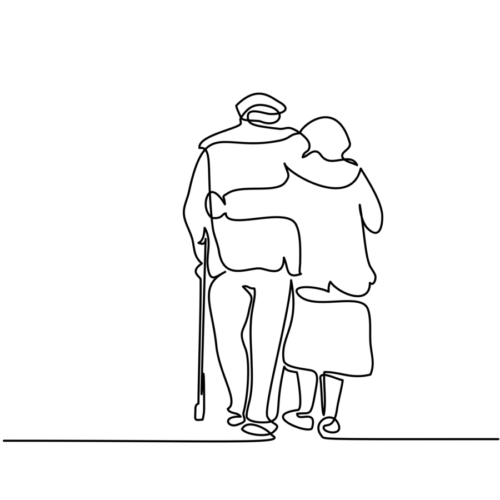
I was 80 last year and together with the effects of Covid-19, the maintenance of my wellbeing can no longer be taken for granted.
As a retired physiotherapist I maybe take more notice of the little movement failings as they begin to appear. I remember in my forties, jumping off a stile and realising that there was no longer a “bounce” as I hit the ground, where had my spring gone? For the last few years I have been determined to remain standing when putting on or taking off my knickers and trousers but it has become more difficult. I have to keep my eyes fixed on something which doesn’t move and even that doesn’t always work! Standing from sitting with my arms crossed in front of me (a favourite exercise given to us oldies) has suddenly become more difficult. Did I always have to move to the edge of the seat before doing it?
When lockdown began I developed an excruciating pain in my left shoulder blade. Sitting with my legs up was the only bearable position and so that was how I spent most of the day. Although in my head I knew how quickly “what you don’t use you lose” applies to older people, I was still amazed to find my legs were getting wobbly and it was with some trepidation that I began my first walk outside when the pain started to ease.
At a conference two years ago one of the speakers gave us a list of the order in which functional decline occurs. To my horror, first on the list was having someone else cut your toenails. That year I had started using the AgeUK “Clipit” service in Bromley; my functional decline had commenced! During lockdown, the need to get my toenails cut became far more pressing than a visit to the hairdressers. How priorities change with age.
This personal preamble started me thinking about all the little things which support wellbeing in us older adults. My social wellbeing is supported by my ability to move about. Overlong toenails cause painful feet. Functioning eyes and ears support safety when moving and the ability to socialise and enjoy entertainment. Regular dental check-ups will hopefully prevent toothache and maintain the ability to enjoy a good diet. Many of us have six monthly or annual blood pressure checks and blood tests. All these support services which we take for granted, suddenly became unavailable as lockdown commenced. As a consequence ear wax may have remained in situ, needed cataract operations been delayed, potential new treatment needs not diagnosed etc. etc. These are not the tragic consequences rightly being relayed in the media. However I suspect the wellbeing of many older people will have been affected in one or more of these ways.
“ When you have a problem using a public toilet, just think how much worse it is for someone with dementia”
But the absolute essential for peace of mind when enjoying being outside is the availability of public toilets in case of urgent need. In my borough most, if not all of the public toilets apart from those in The Glades shopping precinct, have disappeared. They have been replaced by a Community Toilet Scheme. Shops, cafes etc. who provide toilets for their customers offer their facilities to all and the Council pays them a contribution to cover cleaning, toilet rolls etc. An excellent idea in theory but in practice how many of us know about it and what about visitors to the borough? Although I know about the scheme, I have only ever noticed one sign saying community toilet and that is at Beckenham Odeon. There needs to be more effective publicity.
When you have a problem using a public toilet, just think how much worse it is for someone with dementia who may have more difficulty solving the problem and is likely to become very distressed as a result. Good signage is needed to direct you to the toilet, to tell you how to access the water for hand washing (there are now so many different ways) to show you which is the exit door and to direct you back to where you came from. The new energy and water usage efficient eco- friendly toilets need instructions on how to unlock the lid! Hand driers need to be placed out of the line of normal traffic so that they don’t make you jump when you’ve turned them on just by walking past. There is a need to stop using mirrors as design features – this causes perceptual difficulties. Décor needs to be in line with recommendations re contrasting colours etc. I don’t have dementia but following my husband’s difficulty in finding his way out of public toilets (he had Alzheimer’s disease but was able to independently use a public toilet) I have become an advocate for improvements. Some might call it an obsession!